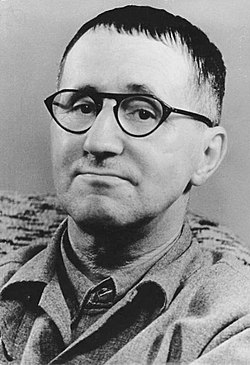Bertolt Brecht Quote
Related Quotes
Perhaps it is true that, by some definitions, Satan is more religious than God. Many of the particularly proud sinners are deceived into thinking that Satan is anti-religious, that he likes seeing peo...
Criss Jami
Tags:
accusation, accuser, anti religious, apologetics, blame, deception, devil, evil, father of lies, fault
One's suffering, one's melancholy is, in itself, really only looked upon as failure or as punishment, as detestable or sinful or socially unacceptable in the eyes of man; but this is not so in the eye...
Criss Jami
Tags:
adversity, affliction, anxiety, apologetics, broken, broken heart, caring, christ, compassion, crushed
About Bertolt Brecht
Eugen Berthold Friedrich Brecht (10 February 1898 – 14 August 1956), known as Bertolt Brecht and Bert Brecht, was a German theatre practitioner, playwright, and poet. Coming of age during the Weimar Republic, he had his first successes as a playwright in Munich and moved to Berlin in 1924, where he wrote The Threepenny Opera with Elisabeth Hauptmann and Kurt Weill and began a life-long collaboration with the composer Hanns Eisler. Immersed in Marxist thought during this period, Brecht wrote didactic Lehrstücke and became a leading theoretician of epic theatre (which he later preferred to call "dialectical theatre") and the Verfremdungseffekt.
When the Nazis came to power in Germany in 1933, Brecht fled his home country, initially to Scandinavia. During World War II he moved to Southern California where he established himself as a screenwriter, while also being surveilled by the FBI. In 1947, he was part of the first group of Hollywood film artists to be subpoenaed by the House Un-American Activities Committee for alleged Communist Party affiliations. The day after testifying, he returned to Europe, eventually settling in East Berlin where he co-founded the theatre company Berliner Ensemble with his wife and long-time collaborator, actress Helene Weigel.
When the Nazis came to power in Germany in 1933, Brecht fled his home country, initially to Scandinavia. During World War II he moved to Southern California where he established himself as a screenwriter, while also being surveilled by the FBI. In 1947, he was part of the first group of Hollywood film artists to be subpoenaed by the House Un-American Activities Committee for alleged Communist Party affiliations. The day after testifying, he returned to Europe, eventually settling in East Berlin where he co-founded the theatre company Berliner Ensemble with his wife and long-time collaborator, actress Helene Weigel.
